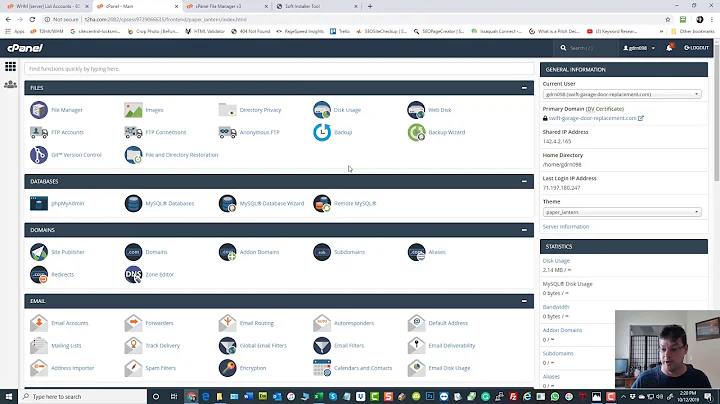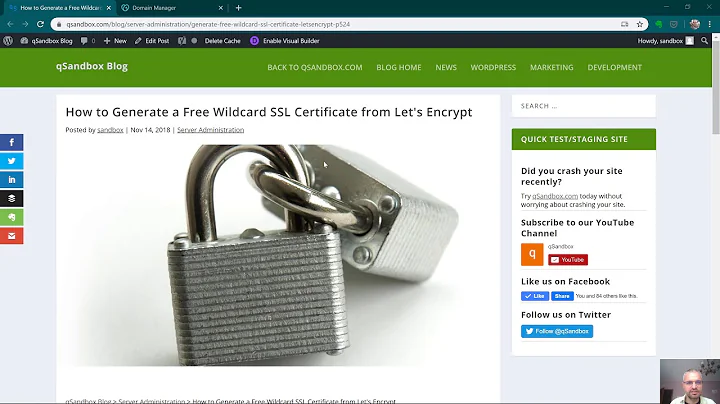VirtualHost with wildcard VirtualDocumentRoot
I use them :) You forgot about switching off canonical names - unfortunately I don't know why there must be ServerAlias in my configuration - it just won't work without it - code below is tested and working
<Directory "C:/LocalServer/*/public">
Options Indexes FollowSymLinks
AllowOverride All
Order allow,deny
Allow from all
Require local
</Directory>
<VirtualHost *:80>
# Apache will form URLs using the hostname supplied by the client
UseCanonicalName Off
# available aliases to use
ServerAlias *.lab *.lab2
# where to put them
VirtualDocumentRoot "C:/LocalServer/%2/%1/public/"
</VirtualHost>
Related videos on Youtube
Mike Rockétt
Updated on September 16, 2022Comments
-
 Mike Rockétt over 1 year
Mike Rockétt over 1 yearI'm trying to create a fallback for my virtual hosts. My configuration looks like this:
# Fetch all pre-defined hosts Include "conf/extra/vhosts/*.conf" # Fallback NameVirtualHost *:80 <Directory "C:/LocalServer/usr"> Options Indexes FollowSymLinks Includes AllowOverride All Order allow,deny Allow from all </Directory> <VirtualHost *:80> VirtualDocumentRoot "C:/LocalServer/usr/%-1/projects/%-2+/public/" </VirtualHost>The objective here is the following: If I try to access
http://test.lab/, I want it to automatically pick up the following directory:C:/LocalServer/usr/lab/projects/test/public/.Now, I have created the folders, and an empty index file (
index.php). Nonetheless, Apache keeps showing me an empty Directory Index ("Index of").No quite sure what to do now. Have tried a few things, none of which seem to work.
Any ideas?
Update - 1 June
I am now using this code, based on the first answer (well, the only one):
<VirtualHost *:80> UseCanonicalName Off ServerAlias *.lab VirtualDocumentRoot "C:/LocalServer/%2/%1/public" <Directory "C:/LocalServer/%2/%1/public"> Options Indexes FollowSymLinks Includes AllowOverride All Order allow,deny Allow from all </Directory> </VirtualHost>I now get an Access forbidden error from Apache. One would surely, normally, receive this error when the directory does not exist?
C:/LocalServer/lab/test/publicdoes exist, and an emptyindex.phpresides in thepublicdirectory.The error in the general error log:
[client 127.0.0.1:49342] AH01797: client denied by server configuration: C:/LocalServer/lab/test/public/If I remove the
<Directory/>group, nothing changes. I still get the error. (Can I even use%nin that group?)Quick Note:
The reason it wasn't working before was due to the fact that I had other Virtual Hosts being imported, by means of the
Include "conf/extra/vhosts/*.conf"instruction. Commenting it out (and thus making the Labs rule the only one) initiated the Access forbidden error.Also note that I am no longer using the
usrfolder - each Lab is now in thelabfolder, underLocalServer.Update 2
It seems that the
<Directory/>block does not allow for variables to be inserted, likeVirtualDocumentRootdoes.Update 3 - Solution Found
It is now working - would not have been able to do it without the help. Here's the final code:
<VirtualHost lab:80> UseCanonicalName Off ServerAlias *.lab VirtualDocumentRoot "C:/LocalServer/%2/%1/public" <Directory "C:/LocalServer/lab/*/public"> Options Indexes FollowSymLinks AllowOverride All Order Allow,Deny Allow from all </Directory> </VirtualHost>Update 4 (April 2015)
New Directive, for those interested (using latest Apache 2.4):
<VirtualHost *:80> UseCanonicalName Off ServerAlias *.local VirtualDocumentRoot "D:/home/%-2+/public_html" <Directory "D:/home/*/public_html"> Require all granted AllowOverride All Options Indexes FollowSymLinks </Directory> </VirtualHost>This, with the combination of Acrylic DNS Proxy, makes magic.
Update 5 (December 2016)
I'm now using a Macro approach.
# Directory Macro - Default Directory configuration on a per-vhost basis <Macro Directory $dir> <Directory "z:/var/www/$dir/public_html"> Require all granted Options Includes Indexes FollowSymLinks AllowOverride All </Directory> </Macro> # LocalSub Macro - For specific *.*.local subs that require their own root <Macro LocalSub $sub $domain> <VirtualHost 127.0.0.1> ServerName $sub.$domain.local DocumentRoot “z:/var/www/$domain/$sub/public_html” Use Directory $domain/$sub </VirtualHost> </Macro> Use LocalSub blog rockettpw # Main virtual host <VirtualHost 127.0.0.1> UseCanonicalName Off ServerAlias *.local *.*.local VirtualDocumentRoot “z:/var/www/%-2/public_html” Use Directory * </VirtualHost>-
 Mike Rockétt about 9 years@SuperSpy - Naturally, I have an entry for each domain (though, I'm no longer using *.lab). That said, I'm currently trying to get Acrylic DNS Proxy working. I would think so, but I always keep my server on the same drive as my site-data.
Mike Rockétt about 9 years@SuperSpy - Naturally, I have an entry for each domain (though, I'm no longer using *.lab). That said, I'm currently trying to get Acrylic DNS Proxy working. I would think so, but I always keep my server on the same drive as my site-data. -
 Mike Rockétt about 9 yearsYour NameVirtualHost may be set to
Mike Rockétt about 9 yearsYour NameVirtualHost may be set to*:80, which means theVirtualHostdirective must be set to match. I have updated my question to show you what I am currently using. -
 Huelfe about 8 yearsUpdate 4 was exactly what I was looking for! Thank you so much!
Huelfe about 8 yearsUpdate 4 was exactly what I was looking for! Thank you so much!
-
-
 Mike Rockétt almost 11 yearsI did try something quite similar to that, albeit with a few more lines of the usual stuff. Will try your attempt exactly as you have it. Hope it works! :)
Mike Rockétt almost 11 yearsI did try something quite similar to that, albeit with a few more lines of the usual stuff. Will try your attempt exactly as you have it. Hope it works! :) -
 Ochi almost 11 yearstry to define <Directory> as I did it - it must work - "Require local" is optional
Ochi almost 11 yearstry to define <Directory> as I did it - it must work - "Require local" is optional -
 Mike Rockétt almost 11 yearsThanks! I picked up the Directory problem - and initially just used
Mike Rockétt almost 11 yearsThanks! I picked up the Directory problem - and initially just usedlab/. But, yours is better. Wouldn't have been able to fix this without you - many thanks! -
Hussain KMR Behestee over 8 yearsI think "Require all granted" is a must.







